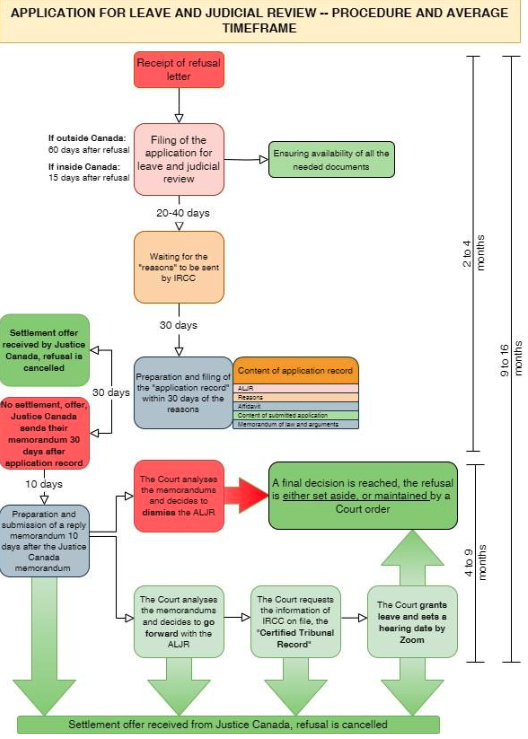Understanding Judicial Review in Canadian Immigration Law: A Comprehensive Guide
Introduction
In a previous blog post, we have discussed the options available to applicants whose visa applications have been refused. One of these options is challenging visa application refusals through Judicial Review in Canada, often referred to as an Application for Leave and Judicial Review (ALJR). In Canadian law, this legal action allows a Canadian court can overturn a decision made by any administrative officer. Visa officers who accept or refuse visa applications can be subjected to judicial review by the Federal Court of Canada.
This guide outlines the essential mechanisms, steps, and potential outcomes of pursuing an ALJR, offering a pathway for those seeking to understand and navigate the complexities of Canadian immigration law.
What is judicial review, exactly?
As previously mentioned, judicial review stands as a critical legal safeguard within Canadian immigration law, allowing the Federal Court to meticulously review administrative decisions, notably visa refusals. While it may sound similar to an appeal, it is functionally different. Through judicial review, the Federal Court examines the decision of the officer in light of the submitted application, not to determine where it was the “good” decision or one that the judge would have personally made, but instead, to decide whether the visa refusal decision conforms to Canadian law.
Indeed, a decision can violate the law in two major ways:
- Procedural unfairness: A decision that is procedurally unfair does not conform to Canadian law. In Canadian immigration law, a procedurally unfair decision is one where the officer should have given the applicant the right to present his or her case fully, but failed to do so. This principle is integral to Canadian legal standards, mandating that decisions must be made following a fair process.
- Unreasonableness: An unreasonable decision is a decision where the officer, in the reasons for the refusal, committed errors or failed to justify his or her decision. If the reasons are not justified, intelligible or transparent, then a decision is likelier to be unreasonable. The judge does not need to agree with the officer, who possesses significant discretion, but the Court needs to understand the rationale and logic of the decision and what concrete factors led the officer to refuse a visa application.
In its judgments, the Federal Court frequently encounters visa refusals deemed unreasonable, more so than those identified as procedurally unfair. When a judge determines a decision violates legal standards, they do not simply convert the refusal into acceptance. Instead, the court mandates the IRCC to meticulously reevaluate the application, ensuring a decision is made with heightened scrutiny. This directive underscores the importance of a thorough judicial review process, safeguarding applicants' rights to fair and lawful assessment. For applicants, it tends to increase success chances as the visa application will be examined carefully.
What steps are involved in an ALJR?
An application for leave and judicial review is a legal procedure with the Federal Court where a lawyer from the Department of Justice Canada is assigned to defend the legality of the decision of the visa officer. As such, it must follow certain requirements in accordance with the Immigration and Refugee Protection Act, the Federal Courts Act, and the Federal Courts Citizenship, Immigration and Refugee Protection Rules.
Timely Submission: The First Step to Challenging Visa Refusals
Timeliness is crucial in filing an ALJR: Applicants within Canada have a 15-day window post-decision, while those outside Canada are given 60 days. This critical stage may also involve a request for the Federal Court to compel the IRCC to disclose the comprehensive reasons for refusal, beyond the initial letter, including the visa officer’s notes. Astute readers of our blog may notice the similarities to the procedure of requesting the GCMS notes through an ATIP request.
Perfecting Your File: The Application Record
Once the reasons are received, the applicant must produce an “Application record” where he or she explains all the legal reasons for which the decision must be overturned, with supporting evidence and the correct references to the law, namely in a document called “memorandum of law and argument”. The Application record must be filed within a thirty (30) day delay from the reception of the reasons by IRCC.
The Path to Resolution: Settlement, or Hearing, and Potential Outcomes
IRCC's response can vary, from instructing the Justice Canada lawyer to defend the decision with their memorandum to proposing a settlement if the applicant’s case is convening. Settlements can lead to a mutual agreement to cancel the refusal and reopen the case, potentially resolving the matter within two to four months of initial submission. Absent a settlement, the process can extends towards a hearing, awaiting the Federal Court's leave to grant a hearing date, thus lengthening the timeline, or be dismissed at this stage.
After a hearing with the Federal Court’s judge where both parties argue the merits of their case, a judgment is issued, where the ALJR is either granted, thus overturning the refusal and remitting the visa application for a second decision, or dismissed, thus maintaining the validity of the refusal. However, the judge normally cannot issue a visa, as this decision solely belongs to the visa officer.
This concise overview captures the essential phases of the judicial review process, yet it's important to note that the ALJR journey encompasses additional steps and complexities not shown here but detailed in the accompanying diagram.
Conclusion: Navigating Judicial Reviews with Expertise
In conclusion, judicial reviews are an interesting option for applicants met with Canadian visa refusals by IRCC. If successful, it allows the overturning of the refusal and the clearing of the applicant’s visa record, as well as increased chances of being issued a visa.
Navigating an ALJR can be daunting and complex, making professional legal representation not just beneficial but recommended. At Canadian Future, our team of seasoned lawyers brings expertise and dedication to your case, ensuring the strongest possible representation in your ALJR, aiming for the swift overturning of your refusal. Schedule a consultation with our firm, and let us make your dreams of a Canadian Future come true.
Legal Information Disclaimer
The information provided here is for general informational purposes only and should not be considered legal advice. The content on this site is not intended to create, nor does it constitute a lawyer-client relationship. It's important to consult with a qualified attorney for advice on your specific legal issues.
No responsibility is assumed for any reliance on the information contained herein, and Canadian Future disclaims all liability in respect to such information. This site may not reflect the most current legal developments; therefore, information here should not be used as a substitute for legal advice from a licensed professional attorney in your jurisdiction.


Leave a comment